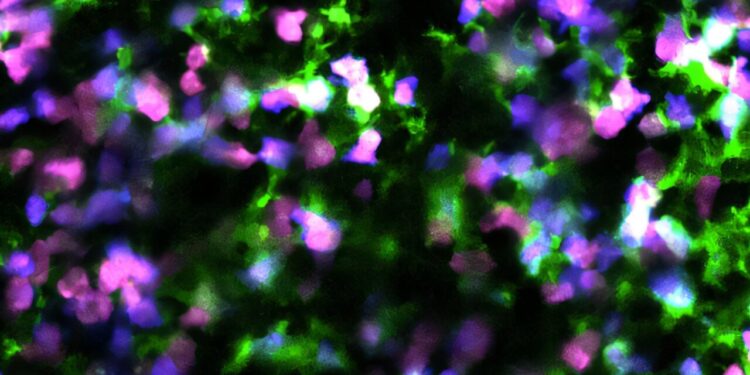Observation of cancer cell death in a preclinical model using in vivo two-photon imaging. In magenta, live cancer cells; in blue, dying cancer cells; in green, macrophages. Credit: Dynamics of Immune Responses Unit—Institut Pasteur
The goal of immunotherapy strategies is to harness cells in the patient’s immune system to destroy tumor cells. Using a preclinical model, scientists from the Institut Pasteur and Inserm have succeeded in stimulating an effective anti-tumor immune response by reprogramming the death of malignant B cells. They demonstrated an effective triple therapy approach to treating forms of blood cancer such as certain lymphomas and leukemias that affect B cells. The study was published August 15 in the journal Scientific advances.
Immunotherapy strategies represent a major advance in the treatment of cancer. They aim to harness the patient’s immune system so that their own cells can specifically recognize and eliminate tumor cells. Immune cells can act as sentinels, scanning the body and identifying any residual tumor cells to reduce the risk of relapse. Various new immunotherapy strategies are emerging, one of which uses a cell death mechanism called necroptosis. Unlike apoptosis, which results in silent cell death, necroptosis releases warning signals that attract and stimulate immune cells so they can kill any remaining tumor cells.
Scientists from the Dynamics of Immune Responses unit (joint Inserm/Institut Pasteur unit) explored the effectiveness of this immunotherapy strategy based on necroptosis on hematologic malignancies. They began by observing that necroptosis cannot be easily induced in malignant B cells due to the absence of MLKL protein.
To overcome this obstacle, scientists combined the administration of three drugs already used in clinical practice. They confirmed the induction of necroptosis and observed a strong immune response leading to the complete elimination of leukemia in a preclinical model.
“The triple therapy that we used forces cancer cells to die, which activates the immune system,” explains Philippe Bousso, Inserm research director, head of the Dynamics of Immune Responses unit at the Institut Pasteur and last author of the article.
The results were observed in preclinical models using an innovative intravital imaging technique. The scientists were able to monitor in real time the interactions between immune cells and cancer cells for the different types of induced cell death.
“This new immunotherapy strategy, successfully tested in preclinical models, transforms tumor cells into triggers for the immune system, opening the way to a potential therapeutic avenue for certain cancers, such as lymphomas or leukemias affecting B cells,” explains Bousso.
“By changing the way cancer cells die, we can harness the support of our immune system to fight the tumor,” he concludes.
More information:
Ruby Alonso et al, Reprogramming RIPK3-induced cell death in malignant B cells promotes immune-mediated tumor control, Scientific advances (2025). DOI: 10.1126/sciadv.adv0871
Provided by the Pasteur Institute
Quote: Blood cancer: scientists reprogram the death of cancer cells to trigger the immune system (October 10, 2025) retrieved October 10, 2025 from
This document is subject to copyright. Except for fair use for private study or research purposes, no part may be reproduced without written permission. The content is provided for informational purposes only.



